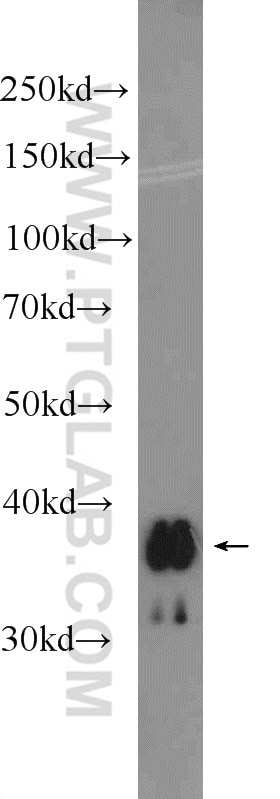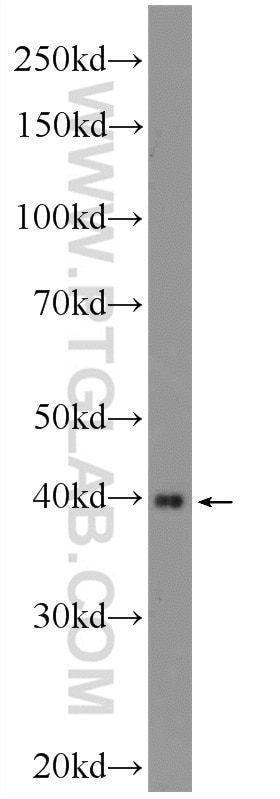UCP5 Polyklonaler Antikörper
UCP5 Polyklonal Antikörper für WB, ELISA
Wirt / Isotyp
Kaninchen / IgG
Getestete Reaktivität
human
Anwendung
WB, ELISA
Konjugation
Unkonjugiert
Kat-Nr. : 25223-1-AP
Synonyme
Galerie der Validierungsdaten
Geprüfte Anwendungen
| Erfolgreiche Detektion in WB | fetales humanes Hirngewebe, PC-3-Zellen |
Empfohlene Verdünnung
| Anwendung | Verdünnung |
|---|---|
| Western Blot (WB) | WB : 1:200-1:1000 |
| It is recommended that this reagent should be titrated in each testing system to obtain optimal results. | |
| Sample-dependent, check data in validation data gallery | |
Produktinformation
25223-1-AP bindet in WB, ELISA UCP5 und zeigt Reaktivität mit human
| Getestete Reaktivität | human |
| Wirt / Isotyp | Kaninchen / IgG |
| Klonalität | Polyklonal |
| Typ | Antikörper |
| Immunogen | UCP5 fusion protein Ag18661 |
| Vollständiger Name | solute carrier family 25 (mitochondrial carrier, brain), member 14 |
| Berechnetes Molekulargewicht | 325 aa, 36 kDa |
| Beobachtetes Molekulargewicht | 36-40 kDa |
| GenBank-Zugangsnummer | BC119666 |
| Gene symbol | SLC25A14 |
| Gene ID (NCBI) | 9016 |
| Konjugation | Unkonjugiert |
| Form | Liquid |
| Reinigungsmethode | Antigen-Affinitätsreinigung |
| Lagerungspuffer | PBS mit 0.02% Natriumazid und 50% Glycerin pH 7.3. |
| Lagerungsbedingungen | Bei -20°C lagern. Nach dem Versand ein Jahr lang stabil Aliquotieren ist bei -20oC Lagerung nicht notwendig. 20ul Größen enthalten 0,1% BSA. |
Hintergrundinformationen
UCP5, also known as BMCP1 (brain mitochondrial carrier protein-1), is a member of uncoupling proteins (UCPs) that catalyze proton leaks across the inner mitochondrial membrane, thus uncoupling fuel oxidation from ATP synthesis. UCPs are implicated in metabolic rate and adaptational thermoregulation. UCP5 is widely expressed with high abundance in brain and testis. Alternative splicing generates several isoforms of UCP5.
Protokolle
| Produktspezifische Protokolle | |
|---|---|
| WB protocol for UCP5 antibody 25223-1-AP | Protokoll herunterladen |
| Standard-Protokolle | |
|---|---|
| Klicken Sie hier, um unsere Standardprotokolle anzuzeigen |



